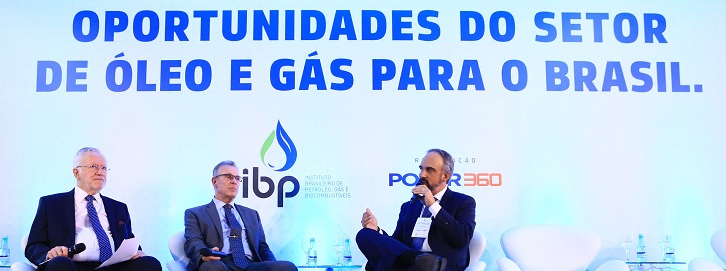Seminar promoted by IBP in Brasília focus in the opening of the gas market

The Minister of Mines and Energy, Bento Albuquerque and the president of IBP, José Firmo, joined the Seminário Oportunidades na Indústria de Óleo e Gás (Opportunities in the O&G industry Seminar) to discuss the relevance of the opening of the natural gas market and market practices in fuel price formation. The event promoted by the institute in partnership with Poder 360, was held in Brasília, on April 16.
According to the Minister, the review of the surplus auction agreement with Petrobras by the National Energy Policy Council (CNPE) will allow the auctioning of onerous disposal blocks, which have low exploratory risk and “great potential [for oil discovery and production] to attract investments and companies to the country.” The agreement foresees the payment of about US$ 9 billion by the government to Petrobras for the surplus reserves, on a bid scheduled at the end of October.
This effort, said the Minister, belongs to a set of changes in oil and gas sector, with a multiannual bid rounds calendar and adjustments in the legal framework to the opening of the natural gas market. “We are searching for a better process management and the regulatory and legal stability to ensure competitiveness and interest of companies from around the world”, said the Minister of Mines and Energy.
One of the main points, he highlighted, is to work for the approval in Congress, of the “Natural Gas New Market” project, which IBP played an important role in its conception.
The IBP president, José Firmo, said that “the gas is, undoubtedly, the alternative that Brazil has to stand out in the global process of energy transition”, generating investments, jobs, income and allowing “the Brazilian industry revolution” by means of an input at abundant and competitive cost. The executive mentioned the USA example, where the increased gas supply promoted a “reindustrialization” of the country.
Firmo also highlighted that the Brazilian oil and gas sector will be responsible for 60% of industrial investments between 2017 and 2020 and might generates, alone, about R$ 93 billion of tax collection per year – only with the oil and gas exploration and production segment, without considering the other links in the chain.
PRICE POLICY AND DOWNSTREAM OPENING
Aligned with Minister Bento Albuquerque, the IBP president defended “an open and free price environment” for the proper market functioning, although it emphasizes the complexity of the subject. “We will only find a solution with an opening in refining, which allows free price competition in the domestic market with multiple agents, such as we already achieved in the exploration and production segment.”